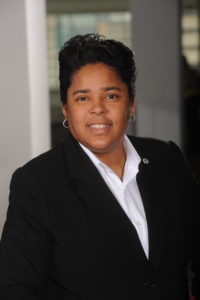Provost Snowden discusses her philosophy of mentorship and shares her experiences

Dr. Monique L. Snowden, Provost and Senior Vice President
Dr. Monique L. Snowden, Provost and Senior Vice President at Fielding, recently received the Outstanding Mentor Award from the American Association of Collegiate Registrars and Admissions Officers (AACRAO). This award recognized her for an exceptional commitment and personal investment in the mentorship, guidance, and development of others. In celebration of International Women’s Day on March 8, we discussed with Dr. Snowden what it takes to cultivate impactful mentorship relationships and experiences.
Can you recall an experience when you were a mentee? How did you encounter your mentor?
I am a 2015-2016 American Council on Education (ACE) Fellow. My host-institution mentor was President Soraya M. Coley at California State Polytechnic University, Pomona (Cal Poly Pomona). During the fellowship, I observed Dr. Coley build her team and navigate numerous institutional challenges. One of the most memorable pieces of advice she shared with me was to take care in attempting to manage emotional matters with logical responses. Often when emotions run high, solely conveying rational points of view may not be the most constructive issue management approach.
What are some highlights of your experience as a mentor to others?
Individuals with whom I enter a mentoring relationship should take an active role in our experience together. As a mentor, one of my goals is to help the other person seek out unfamiliar domains and roles—moving outside of their comfort zones. In that regard, I enjoy assisting others expand and develop their professional and personal capabilities. I serve as a guide rail, go the distance with them, and vision together to achieve their maximum potential.
What makes a successful mentor-mentee experience?
My philosophy is that you choose your mentors. The experience should be mutually beneficial, with each individual bringing something distinct to the relationship and engagement. An ideal mentor identifies potential in the person they agree to support and is patient, open-minded, and forward-thinking. A person seeking mentorship should be goal-oriented, take the initiative, and be keen to learn. Some mentoring relationships are context- and time-bound, such as a job search. I am not offended when people fade away and then come back to me at some point for job reference support. However, if they have not connected with me in a while, I will require a check-in to know what they have been up to—before agreeing to serve as a reference. In terms of my own mentors, I make it a practice to stay in touch. LinkedIn helps to stay connected, particularly considering that many higher educations leaders change positions every few years. When I write to my mentors, I do not necessarily expect them to respond. I simply want to update them on my achievements as a way to appreciate each mentor for the time they have invested in me.
What advice do you have for women who are considering a career in academia?
My career started in the technology sector. Early on, I learned not to let others decide what womanhood means to me. Women must be their own definers. Step into a room as a confident professional. Lead with competency, skill, knowledge, passion, and compassion. Higher education remains male-dominated in terms of presidents and provosts at colleges and universities. If you layer that with intersectionality, what does it mean to lead as a woman of color in a university setting? Upon starting my first job out of college, a senior manager advised me: “Show up to work as your authentic self and do not let others define you. Challenge the organization to accept you for who you are.” She modeled how to be professional, do a good job, and stay true to oneself. I aspire to impart that experience to others.
Join Over 7,500 Fielding Alumni Located Around The World!
Change the world. Start with yours.™






Get Social